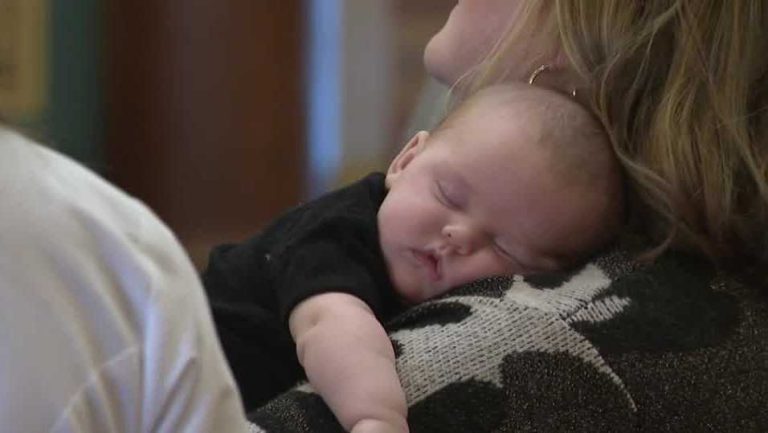Iowa maternal health advocates gathered Tuesday at the Iowa Statehouse to support issues they want lawmakers to prioritize. They are calling on lawmakers to improve access to midwifery care and create more programs in the state that would provide mental health support to pregnant and postpartum mothers. The Iowa chapter of Postpartum Support International is educating lawmakers about the need for a new perinatal psychiatric system. Access program. The organization’s board chair, Brittney Haskins, says it’s a front-line resource that would connect obstetricians, doulas and midwives with a mental health provider for immediate care and medication. even include perinatal, which is a very specific set of mental health issues,” says Haskins. “There are only 5 or 6 in the entire state, so if you live in a rural part of the state, they are already lacking in OB and even more lacking in psychiatric care.” midwives. The Des Moines Midwives Collective says care from certified midwives can improve outcomes for women and their babies. “All nurse practitioners in Iowa are paid 15% less than doctors for the same services,” explains Caitlin Hainley, the founder of the collective. “Every state that touches Iowa has 100% wage parity, making it a better place to work and providing more incentive for hospitals to hire midwives.” Hainley, a certified midwife, is working to open her own independent birth center, says Iowa’s current certification-of-needs laws prevent it from succeeding. A birth center is a healthcare facility staffed by certified midwives and nurses. Iowa currently has none. “We have maternity wards closing left and right,” she says. “We think we should let people who want to get into the business of taking care of moms and babies, get into the business of taking care of moms and babies.” In Gov. Kim Reynold’s State of the State address, she proposed streamlining the process for approving certificates of need to build new health care facilities or improve existing ones. To do this, the governor proposes moving the review process to health and human services with the support of a new health care economist whose role would also include reporting on the state of the care economy of Iowa Health. Maternal health advocates say access to care from midwives could have helped improve maternal racial disparities in the state. “There is a six-to-one disparity for Black mothers who are affected by maternal deaths or morbidities in Iowa and this is largely due to the care provided by providers,” says Rachel Bruns, section chief of the Central Iowa International Cesarean Awareness Network. “We know that midwifery care provides more culturally competent care and that, generally speaking, midwives use evidence to show that they are listening to their patients.” KCCI ON SOCIAL MEDIA: Facebook | YouTube | Instagram | X/Twitter
Iowa maternal health advocates gathered Tuesday at the Iowa Statehouse to support issues they want lawmakers to prioritize. They are calling on lawmakers to improve access to midwifery care and create more programs in the state that would provide mental health support to pregnant and postpartum mothers.
The Iowa chapter of Postpartum Support International is raising awareness among lawmakers about the need for a new perinatal psychiatric access program. The organization’s board chair, Brittney Haskins, says it’s a front-line resource that would allow obstetricians, doulas and midwives to consult with a mental health provider for immediate care and medication.
“Iowa is 44th in the nation in terms of mental health providers and that doesn’t even include perinatal, which is a very specific set of mental health issues,” Haskins says. “There are only 5 or 6 in the entire state, so if you live in a rural part of the state, they are already lacking in OB and even more lacking in psychiatric care.”
Defenders are also calling for better pay for midwives. The Des Moines Midwives Collective says care from certified midwives can improve outcomes for women and their babies.
“All nurse practitioners in Iowa are paid 15% less than doctors for the same services,” explains Caitlin Hainley, the founder of the collective. “Every state that touches Iowa has 100% pay parity, making it a better place to work and providing more incentive for hospitals to hire midwives.”
Hainley, a certified midwife working to open her own independent birth center, says current need certification laws in Iowa prevent her from succeeding. A birth center is a healthcare facility staffed by certified midwives and nurses. Iowa currently has none.
“We have maternity wards closing left and right,” she says. “We think we should let people who want to get into the business of taking care of moms and babies, get into the business of taking care of moms and babies.”
In Governor Kim Reynold’s State of the State Addressshe proposed streamlining the process of approving certificates of need to build new health facilities or improve existing ones. To do this, the governor proposes moving the review process to Health and Human Services with the support of a new health care economist whose role would also include reporting on the state of the care economy of Iowa Health.
Maternal health advocates say access to midwifery care could have helped improve maternal racial disparities in the state.
“There is a six-to-one disparity for Black mothers who are affected by maternal deaths or morbidities in Iowa and this is largely due to the care provided by providers,” says Rachel Bruns, section chief of the Central Iowa International Cesarean Awareness Network. “We know that midwifery care provides more culturally competent care and that, generally speaking, midwives use evidence to show that they are listening to their patients.”
KCCI ON SOCIAL MEDIA:


